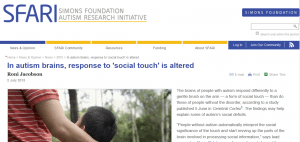In autism brains, response to ‘social touch’ is altered
Research by SomAffect’s Francis McGlone appears in this month’s SFARI newsletter.
“The brains of people with autism respond differently to a gentle brush on the arm — a form of social touch — than do those of people without the disorder, according to a study published 5 June in Cerebral Cortex”
 ““I find it very exciting,” says Kamila Markram, Autism Project director at the Swiss Federal Institute of Technology of Lausanne, who proposed the intense world theory in 2007. The new study supports the idea that sensory overload is a key biomarker of autism.”
““I find it very exciting,” says Kamila Markram, Autism Project director at the Swiss Federal Institute of Technology of Lausanne, who proposed the intense world theory in 2007. The new study supports the idea that sensory overload is a key biomarker of autism.”
Read the full article at sfari.org…
For further reading see:
Kaiser, M. D., Yang, D. Y.-J., Voos, A. C., Bennett, R. H., Gordon, I., Pretzsch, C., Beam, D., Keifer, C., Eilbott, J., McGlone, F. & Pelphrey, K. A. (2015). Brain mechanisms for processing affective (and nonaffective) touch are atypical in Autism. Cerebral Cortex, doi: 1093/cercor/bhv125.

0 Comments